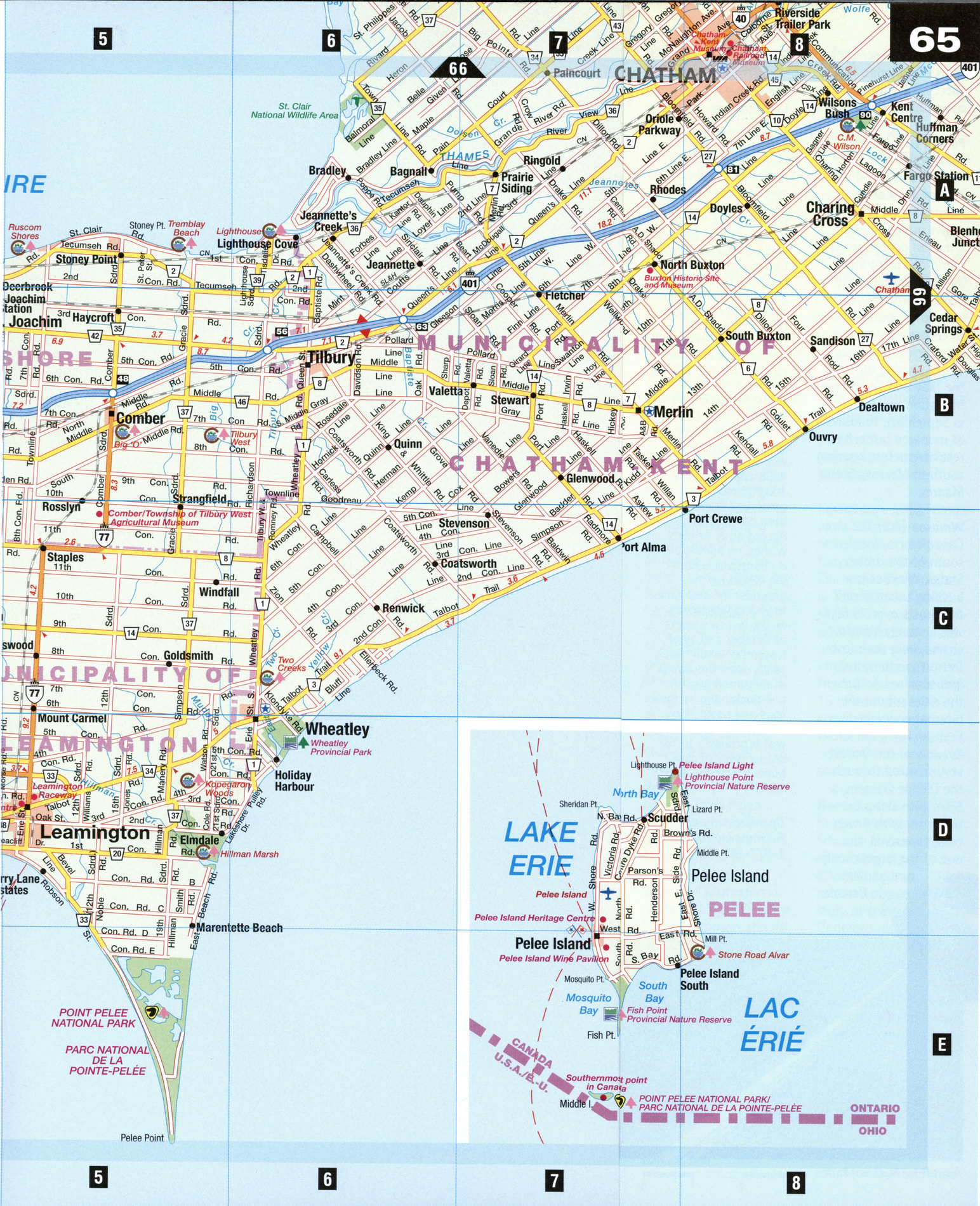Road map Windsor city surrounding area (Ontario, Canada)
Road map of Windsor city, province Ontario Canada
Map of Essex County. Detailed map of the highway and local roads of Essex County with cities and towns.


Large scale road map of Windsor city, province Ontario Canada
Map of Essex County. Detailed map of the highway and local roads of Essex County with cities and towns.
Essex County road map
The southernmost tip of Canada has been an important way station on many a journey. Essex County is a rest stop on major bird and butterfly migration routes and offers unparalleled wildlife experiences. An estimated 30,000 to 50,000 slaves escaping slavery prior to the American Civil War, in the 1860s, made the pilgrimage to Canada, the Promised Land, traveling along the celebrated Underground Railroad. The story of the Underground Railroad is told in stops on the African-American Heritage Tour Route. Bounded by Lake St. Clair to the north and Lake Erie to the south, Essex County is a verdant agricultural area. A wide variety of crops are grown here, many visible from the highways, and several greenhouses offer rare tropical flora.
Amherstburg [C1] This peaceful little town is a must for shipping buffs. The riverside parks are great ship-watching venues as a procession of freighters pass by on the Detroit River. The North American Black Historical Museum provides insight into Black settlement in the Windsor area, and Fort Maiden, now a national historic park, was the British base from which Detroit was captured during the War of 1812.
Kingsville [D4] Situated on Lake Erie's Pigeon Bay, Kingsville is the locus of a number of fascinating southwestern Ontario heritage sites. Five kilometers north of Kingsville is the home of conservationist Jack Miner and The Jack Miner Bird Sanctuary, open to the public. Southwestern Ontario Heritage Village, 10 km north of Kingsville, is a turn-of-the-century village where volunteers in period dress show visitors how pioneers baked, operated looms, and dipped candles.
Leamington [D5] Thanks to its location-on the same parallel as Rome, Italy, and northern California-Leamington is "The Tomato Capital of Canada," with over 80 hectares under greenhouse glass. The ErieQuest Marine Heritage Area features 15 of more than 50 known shipwrecks in the vicinity, making Leamington a popular scuba diving center.
North Buxton [A7] The Buxton National Historic Site and Museum has a rich collection of artifacts that recounts the story of the Underground Railroad and early Black settlement in Canada.
Pelee Island [D7] Linked by car ferry to Kingsville and Leamington, Canada's southernmost inhabited point is picturesque summer-cottage country. You can enjoy the beaches, cycle around the island, visit the oldest stone lighthouse on Lake Erie, and see the ruins of Canada's first successful estate winery dating back to 1865.
Point Pelee National Park [E6] Point Pelee has the smallest dry land area of any Canadian national park, yet it draws more than half a million people yearly. Some 700 plant and 347 bird species have been recorded here, including a number of endangered species. Point Pelee is famous for bird-watching during the May and September migration periods. Also in September, thousands of monarch butterflies rest here before heading south to Mexico's Sierra Madres.
Windsor [A2] The only Canadian city located south of the United States, Windsor is a bustling urban center that hosts over 75 festivals annually. Windsor shares more than just Detroit's automotive industry-in late June the cities mount the International Freedom Festival. For a spectacular view of the Detroit skyline, stroll through the Dieppe Gardens, a 5 km park along the riverfront with flower beds, fountains, and one of the largest sculpture gardens in Canada.
SPECIAL INTEREST
The Father of Conservation
Jack Miner was an avid trapper and hunter who came to realize no species could survive both its natural enemies and man. In 1904, he dug ponds, planted trees, and introduced four Canada geese with clipped wings to the ponds near Kingsville. From 1910 to 1940, Miner lectured on conservation and convinced kings and presidents of its need, thus earning him the Order of the British Empire in 1943.
His former home is now a trust, open year-round. Since 1909 approximately 100,000 migrating geese and ducks have been banded here. According to Miner's wishes, no admission is charged and nothing is sold on the grounds. The best time to visit is late March or the last two weeks of October and all of November when thousands upon thousands of migrating geese and ducks stop by for food and protection. National Wildlife Week was proclaimed to fall on the week of Jack Miner's birthday, April 10th. Open year-round. For more information: 1-877-289-8328